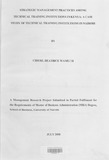| dc.description.abstract | This research was designed to investigate strategic management practices among
technical training institutions in Nairobi. The study sought to achieve two objectives.
The first objective was to establish the strategic management practices adopted by
technical training institutions in Nairobi, and the second was to determine the factors
influencing the strategic management practices among the institutions. To achieve these
objectives, the study adopted a census survey and focused on six technical training
institutions in Nairobi all of which were served with questionnaires. Responses were
received from all of them giving a response rate of 100%.
The findings of the study showed that all the managerial tasks that characterize strategic
management were present in all the institutions except a lack of situational analysis in
one institution. It was established all the institutions studied had written down vision and
mission statements, objectives and strategies, action plans and strategic plans, and
strategy evaluation and control mechanisms. The findings further showed that of the
83.3% of the institutions that undertake situational analysis, such an analysis is the
responsibility of selected members of the institution in 50% of these institutions and of
management in 16.7% of them. Overall, the study established that 66.7% of the
institutions practice purely formal strategic planning while 33.3% adopt both formal and
informal planning process, with the planning horizon ranging from 4 to 5 years in all the
institutions.
The study findings, however, revealed that a number of internal organizational factors
surface to influence the strategic management practices among the institutions. Key
among them were management skills, managerial skills, financial resources, leadership
style and organizational culture and politics which were very highly rated by respondents;
and current organizational structure, existing organizational policies, human resources,
and employee training which were highly rated. Reward system and political interference
were rated as having medium and low influence respectively. | en |

